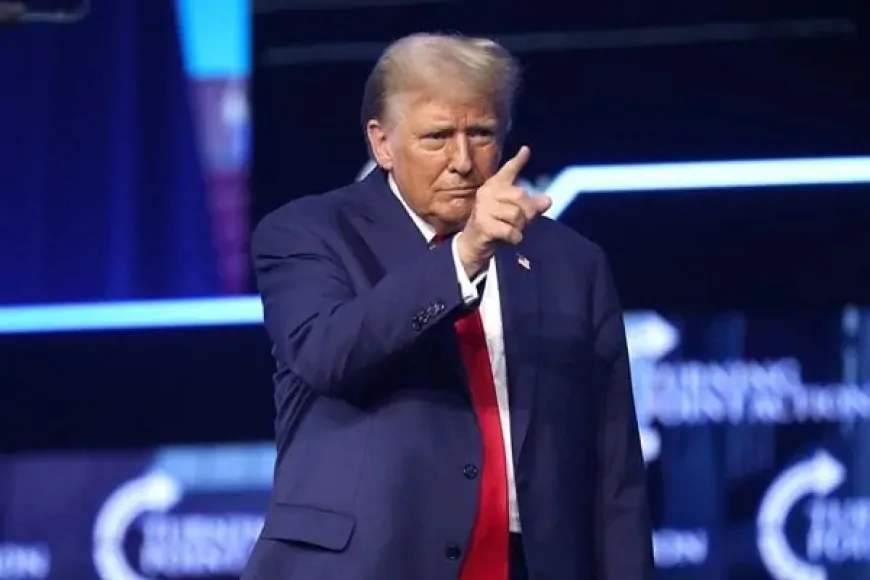President Trump’s New Tariffs on Canada, Mexico & China Could Raise Prices and Shake Markets
Trump’s latest tariffs on Canada, Mexico, and China could drive up costs, impact global trade, and fuel inflation. See how these policies may affect businesses and consumers.

Washington, D.C. – President Donald Trump is set to implement new trade tariffs against the United States' largest economic partners—Canada, Mexico, and China—starting this Saturday. The move, which includes a 25% tariff on imports from Canada and Mexico and a 10% duty on Chinese goods, is intended to reinforce U.S. economic power but could also contribute to rising inflation and global market instability.
Trump has repeatedly emphasized the effectiveness of tariffs as a financial strategy, stating, “The power of the tariff is unmatched. No one can compete with us because we have the strongest economy.”
While some Americans support Trump’s economic approach, others fear potential price hikes and supply chain disruptions. Recent polling from AP VoteCast indicates a divided public opinion on tariffs.
Potential Short-Term Tariffs on Canada and Mexico
There is speculation that the tariffs on Canada and Mexico could be lifted if both nations take stronger action to curb illegal immigration and fentanyl smuggling—two key issues Trump has linked to trade. Meanwhile, the tariffs imposed on China add to existing trade restrictions and are also tied to fentanyl concerns.
Tariffs have been central to Trump's economic strategy since his first term, and despite some advisers downplaying their impact, the latest moves signal a long-term commitment to protectionist trade policies.
Broader Trade Measures in the Pipeline
Trump has hinted at the possibility of additional tariffs on other imported goods, including steel, oil, natural gas, pharmaceuticals, copper, and computer chips. These potential measures could strain relationships with U.S. allies and create further economic uncertainty. Following his announcement, the S&P 500 stock index reacted negatively, reflecting investor concerns.
While the administration aims to drive domestic investment by reducing corporate taxes and rolling back regulations, the potential for increased import costs raises questions about the overall impact on businesses and consumers.
Inflation Worries Amid New Trade Policies
A key aspect of Trump’s campaign centered on addressing inflation, which had surged under the previous administration. However, consumer sentiment data from the University of Michigan suggests that inflation expectations are on the rise, with projected price increases reaching 3.3%—higher than December’s 2.9% annual inflation rate.
Trump has repeatedly argued that tariffs should be a significant revenue source for the federal government, aligning with pre-20th-century economic models. He has drawn inspiration from former President William McKinley, whom he has referred to as the “tariff champion.”
Experts Warn of Economic Fallout
Brad Setser, a senior fellow at the Council on Foreign Relations, noted that these new tariffs could have a more dramatic economic impact than those implemented during Trump’s first term. He also pointed out that levies on Chinese imports could drive up prices on popular consumer products, such as iPhones, creating friction between corporate America and the administration.
Research from economic analysts suggests that these tariffs could slow growth in the U.S., Canada, Mexico, and China. Wending Zhang, an economist at Cornell University, stated that Canada and Mexico might feel the heaviest burden due to their reliance on trade with the United States.
Canada and Mexico React to U.S. Tariffs
Canadian Prime Minister Justin Trudeau acknowledged the potential economic strain on his country but reassured citizens that his government is prepared to respond if necessary. He also highlighted Canada’s CDN$1.3 billion (US$90 million) border security initiative, which addresses some of the concerns raised by the Trump administration.
Meanwhile, Mexican President Claudia Sheinbaum emphasized her country’s efforts to reduce illegal border crossings and crack down on fentanyl trafficking. She reiterated that Mexico is actively engaged in diplomatic discussions and has multiple contingency plans in place. “We have a Plan A, Plan B, and Plan C depending on the U.S. government’s decision,” she said.
Political and Legislative Challenges Ahead
Trump’s trade policies could impact his broader economic agenda, including securing congressional approval for budget proposals, tax cuts, and adjustments to the government’s borrowing limits. If the tariffs prove beneficial, they may bolster his political influence; however, if they result in economic instability, they could weaken his position.
Democratic lawmakers are currently pushing legislation to restrict the president’s ability to impose tariffs without congressional approval. However, with Republicans controlling both the House and Senate, such measures are unlikely to pass.
“If these tariffs take effect, they will damage relationships with allies and place additional financial burdens on working-class families,” said Senator Chris Coons, D-Del. “Congress must act to prevent this from happening again.”
As the new tariffs roll out, their long-term effects on inflation, economic stability, and international trade remain uncertain.
Also Read: Trump Says Tariffs on China Are a Last Resort Amid Global Policy Challenges































































